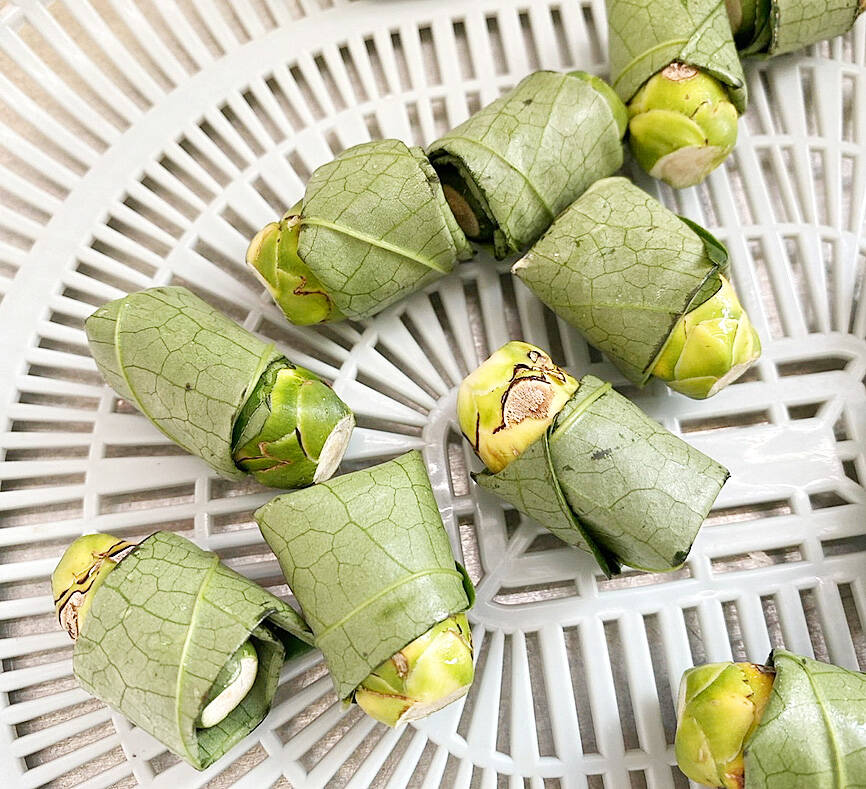The Ministry of Health and Welfare yesterday said it would propose a draft bill on betel nut control by the end of the year, after the Control Yuan urged the Executive Yuan to take action against oral cancer.
Control Yuan members Jao Yung-ching (趙永清), Fan Sun-lu (范巽綠) and Hsiao Tzu-yu (蕭自佑) yesterday issued a statement calling for the creation of a betel nut control act in light of its health impact.
Chewing betel nuts could lead to oral and esophageal cancer, it said, adding that Taiwan’s oral cancer rate is the highest in the world.

Photo: Chang Tsung-chiu, Taipei Times
While Turkey lists betel nut as a narcotic, and Thailand has implemented regulations banning imports of the fruit, “Taiwan has yet to take any proactive action for 20 years,” the statement said.
The Control Yuan had investigated the problem and requested the Executive Yuan to implement regulations in November 2021, but it has not made any concrete progress toward regulating the fruit since, it said.
There have long been no regulations on betel nut, as the ministry “does not regard betel nut as a food that could be regulated by the Act Governing Food Safety and Sanitation [食品安全衛生管理法], while the Ministry of Agriculture does not consider them agricultural produce,” it said.
Although a program has been implemented to replace betel nut trees with environmentally friendly crops, betel nuts remain Taiwan’s second biggest crop after rice, with up to 40,000 hectares of farmland used to cultivate it, the statement said.
Agencies should step up efforts to control betel nut imports, inspect harmful components such as “red lime” and “white lime,” increase incentives for farmers to grow crops other than betel nut, enhance advocacy of betel nut prohibition at schools and step up searches of teenagers suspected of purchasing betel nut, it said.
The Executive Yuan should expedite the establishment of an act to control betel nut use and alert the public to the severe health consequences of chewing betel nut, the statement added.
Minister Without Portfolio Chen Shih-chung (陳時中) on Wednesday attended the interpellation session at the Control Yuan on behalf of the Executive Yuan, along with Minister of Health and Welfare Chiu Tai-yuan (邱泰源) and Deputy Minister of Agriculture Huang Chao-ching (黃昭欽), saying that “the draft act to control betel nut use is expected to be submitted to the Executive Yuan for review between the end of this year and the beginning of next year.”
Department of Oral Health Director-General Chang Yung-ming (張雍敏) yesterday said the department has commissioned experts to help formulate the draft bill, which is expected to be completed by the end of the year.
There are more than 8,000 new cases of oral cancer every year in Taiwan.
The rate of chewing betel nuts has been brought down from 1.18 percent in 2013 to 0.4 percent in 2021 among junior-high students, from 2.46 to 1.66 percent in the same period among senior-high students, and from 5.8 to 3.5 percent among adults, Chang said.
Warning text and pictures would be added to betel nut packages similar to cigarette products, but a health tax would make a bigger impact and would be discussed, she said.

Taiwanese can file complaints with the Tourism Administration to report travel agencies if their activities caused termination of a person’s citizenship, Mainland Affairs Council Minister Chiu Chui-cheng (邱垂正) said yesterday, after a podcaster highlighted a case in which a person’s citizenship was canceled for receiving a single-use Chinese passport to enter Russia. The council is aware of incidents in which people who signed up through Chinese travel agencies for tours of Russia were told they could obtain Russian visas and fast-track border clearance, Chiu told reporters on the sidelines of an event in Taipei. However, the travel agencies actually applied

New measures aimed at making Taiwan more attractive to foreign professionals came into effect this month, the National Development Council said yesterday. Among the changes, international students at Taiwanese universities would be able to work in Taiwan without a work permit in the two years after they graduate, explainer materials provided by the council said. In addition, foreign nationals who graduated from one of the world’s top 200 universities within the past five years can also apply for a two-year open work permit. Previously, those graduates would have needed to apply for a work permit using point-based criteria or have a Taiwanese company

The Shilin District Prosecutors’ Office yesterday indicted two Taiwanese and issued a wanted notice for Pete Liu (劉作虎), founder of Shenzhen-based smartphone manufacturer OnePlus Technology Co (萬普拉斯科技), for allegedly contravening the Act Governing Relations Between the People of the Taiwan Area and the Mainland Area (臺灣地區與大陸地區人民關係條例) by poaching 70 engineers in Taiwan. Liu allegedly traveled to Taiwan at the end of 2014 and met with a Taiwanese man surnamed Lin (林) to discuss establishing a mobile software research and development (R&D) team in Taiwan, prosecutors said. Without approval from the government, Lin, following Liu’s instructions, recruited more than 70 software

Taiwanese singer Jay Chou (周杰倫) plans to take to the courts of the Australian Open for the first time as a competitor in the high-stakes 1 Point Slam. The Australian Open yesterday afternoon announced the news on its official Instagram account, welcoming Chou — who celebrates his 47th birthday on Sunday — to the star-studded lineup of the tournament’s signature warm-up event. “From being the King of Mandarin Pop filling stadiums with his music to being Kato from The Green Hornet and now shifting focus to being a dedicated tennis player — welcome @jaychou to the 1 Point Slam and #AusOpen,” the